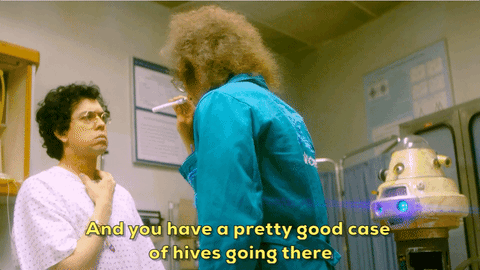Have you ever had the experience of eating something you’ve enjoyed a million times before, but suddenly it made you feel, well, kind of awful? For me, it was dairy. Despite my love for ice cream and mozzarella cheese, not only has it become very painful for me to digest the stuff over the years, dairy seems to worsen my acne when I eat it, too. But the whole experience of figuring out that I needed to cut out milk products from my diet did make me wonder if you can get a food allergy later in life, or if I’d simply been allergic all along, and somehow hadn’t put two and two together.
The fact of the matter is, yes, it is totally possible to develop an allergy in adulthood — and, on top of that, it’s actually relatively common for that to happen. Around 15 percent of people with food allergies are diagnosed over the age of 18, according to the nonprofit organization Food Allergy Research & Education.
While the Mayo Clinic notes that "most food allergies start in childhood," they really can show up at any point in your life. According to the medical center, the most common foods that can cause allergies once you’re an adult are "peanuts, fish, shellfish (shrimp or lobster) and tree nuts (almonds, walnuts, pecans and cashews)."
To say the least, these late-onset food allergies are kind of an enigma (also, like, it’s just plain not fair). Even experts in the space are kind of baffled by the whole thing: Dr. Cosby Stone, Jr., a postdoctoral research fellow in allergy and immunology at the Vanderbilt University Medical Center, told U.S. News & World Report that, in his field of study, developing an allergy to certain pollens and chemicals later in life is generally easier to understand than a sudden issue with something in your diet. In other words, when it comes to something in the air or something you touch, it’s more likely that you might be simply experiencing that allergen for the first time, like a new kind of pollen in a place you haven’t been to before.
Adult-onset food allergies, however, seem to have researchers like Stone a little bit stumped because, oftentimes, they happen with foods that a person wasn’t previously allergic to. Dr. Stone told U.S. News & World Report,
He also explained that people can sometimes outgrow a certain allergy, but then develop a different allergy later on in life to something totally different, that isn’t even necessarily food, or vice versa. Like, you might outgrow your allergy to chocolate that you had as a kid, but then suddenly you’ll be all sneezes in your 20s around your BFF’s darling cat, Stanley. Go figure, right?
But before you worry yourself into a frenzy that you’re going to eat a peanut butter and jelly sandwich and suddenly break out in hives or have trouble breathing, there’s a chance that, if you are developing an allergy to something, you might be able to notice before it turns into a major issue.
"If you suspect a food allergy based on symptoms like itching in your mouth, hives or rashes, vomiting, diarrhea, or belly pain," registered dietitian Beth Warren, MS, CDN, founder of Beth Warren Nutrition, tells Elite Daily in an email, "then it is definitely worthwhile to go to an allergist for a full testing panel."
Better safe than sorry, right?
Source: Read Full Article

